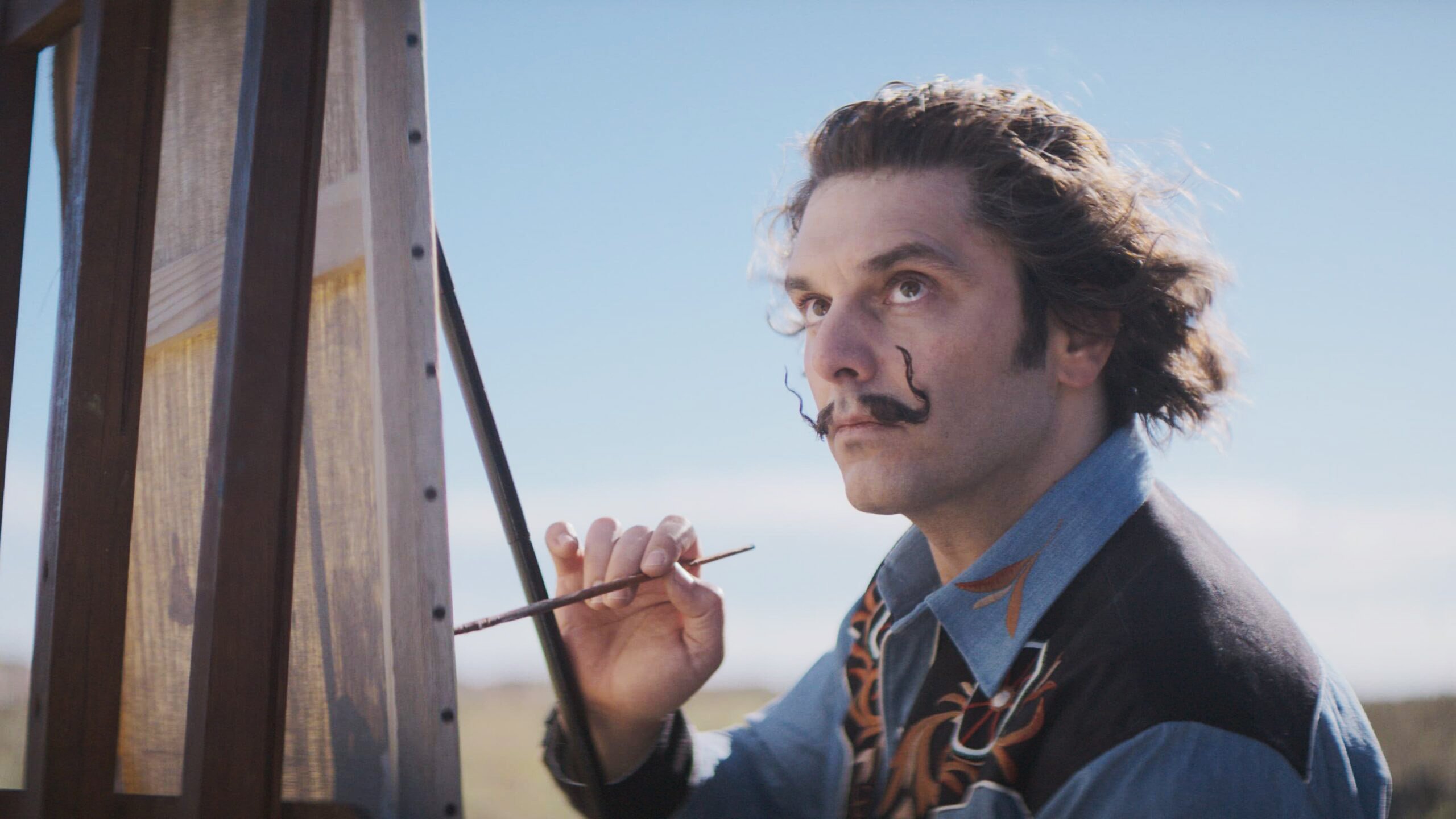
What even is Daaaaaalí!? Is it a biopic of Salvador Dalí? A portrait? An homage or a meta-narrative? A dream? Maybe it’s not any of those things, or all of them at once.
It most definitely is a film written and directed by French filmmaker Quentin Dupieux. Its plot, such as it is, centers on the many attempts of a journalist, Judith (Anaïs Demoustier), to interview the renown Spanish painter. Hers is an uphill task: her subject is cocky and intractable, beyond pinning down. To further complicate things, Dalí is played by no less than five actors (Jonathan Cohen, Pio Marmaï, and Édouard Baer among them), each showing up at random points and all of them wearing the Surrealist’s affectations with some relish.
Edouard Baer and Anaïs Demoustier in Daaaaaalí! (2023). Photo courtesy of Music Box Films.
The narrative that follows escapes logical description, untethered as it is by time, place, and reality.
Judith’s bids to interview Dalí grow ever more desperate and extravagant, her journalistic piece evolving from a print article into a full-length “cinematographic” feature to sate his vanity. Dalí paints The Invisible Harp, Fine and Medium, then encounters his older self. A Catholic priest recounts to the artist a dream in which he is shot by a cowboy—a tableau depicted in a small painting that Judith later gifts to Dalí at her third interview attempt. She says she bought it at a flea market; Dalí scrawls his name on it and the work sells at auction for millions. Or maybe it doesn’t: Père Jacques might have dreamt this part too.
Jonathan Cohen in Daaaaaalí! (2023). Photo courtesy of Music Box Films.
These digressions only sound exhausting. On screen, the seemingly disjointed proceedings are alleviated by Dupieux’s deranged dream logic and playful hand, which mine comedy from the clash between Dalí’s world and our own. His finest gag sees Dalí painting Harp not from some imagined Surrealist vision, but from a real-life scene featuring a man supporting his extended head with a crutch and another one who grows tired of holding a rag in his mouth. At another point, Dalí paints a portrait of his wife Gala, who deadpans of the piece: “It’s anachronistic that you’re painting it now. It’s from 1972.”
Dupieux, of course, has long had a handle on the absurd, if not the surreal. Since his cinematic debut Rubber (2010), a horror film about a tire, his outings have only grown bolder—see 2019’s Deerskin about a jacket that takes over its wearer’s life, or 2022’s Incredible But True about a time-travel sewer. His approach to Dalí was never going to be that of a conventional biopic: “The trick I followed when working on the script was to avoid real events from his life,” he told Mubi.
Salvador Dalí. Photo: Hulton Archive / Getty Images.
And why shouldn’t he? The colorful life and times of Dalí have been raked over in countless biographies, documentaries, and ponderous biopics (most recently, 2022’s Dalíland). We already know about his otherworldly art, his eccentric interior decor, his impishness, and his choice pronouncements such as “I don’t do drugs. I am drugs.”
Any further attempt to unpack the Spaniard’s outsized personality or psychology would merely be tedious or, as on-screen Dalí would argue, “abysmally boring.” Notably, he also describes his “mediocre” paintings as depicting only “an infinitesimally small part of Dalí’s personality.”
Dupieux himself has noted the impossibility of filming the artist’s life: “You keep running after Dalí.” Far more interesting that his movie joyously bottles the spirit of the artist (much as Todd Haynes did in his 2007 Bob Dylan biopic I’m Not There), wearing his humor, conceit, and ultimate unknowability lightly yet slyly. Far more vivid that he invent a scene such as the one in which Dalí gripes that Muhammad Ali stole his name (Muhamma-Dalí, get it?) and needs to change it because “I was stage center first!”
Anaïs Demoustier in Daaaaaalí! (2023). Photo courtesy of Music Box Films.
As for Judith, Dupieux’s evident stand-in, she never really catches up to Dalí. Her film project winds up including footage of the artist interviewing her about trying to interview him, bookended by his multiple reactions to the completed work—Dalí having entirely consumed her efforts. It’s an absolute rebus, contained within the larger enigma that is Daaaaaalí! One gets less a feel of the man than the effect of standing, amusedly and bemusedly, in his wake. It’s quite a sensation.
Daaaaaalí! is now opening nationwide in the U.S.